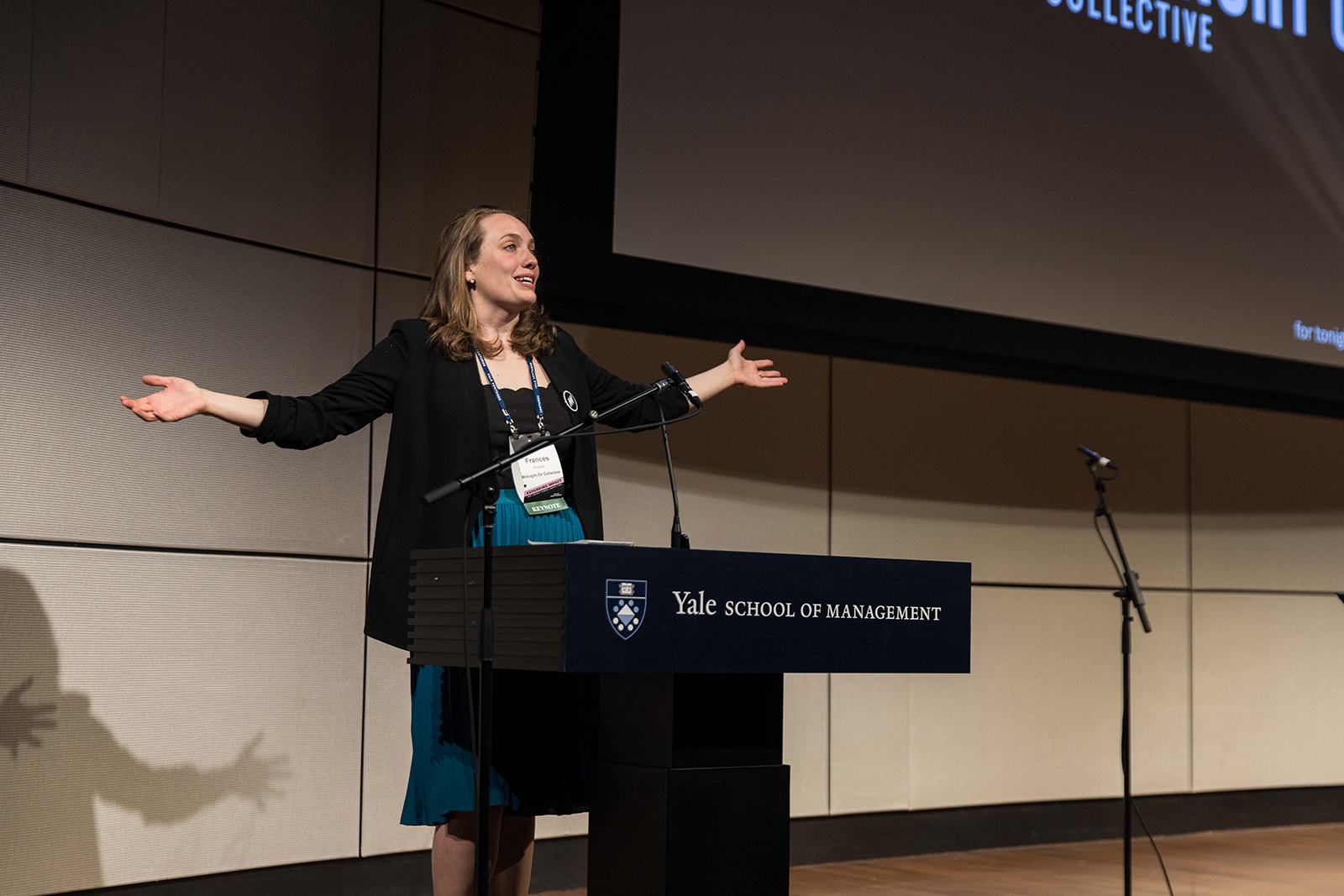Reimagining the Business of Art: How MOC is Transforming Cultural Entrepreneurship

By Grace Rangel ’25
Six years ago, the idea for the Midnight Oil Collective (MoC) began to take shape in founder Frances Pollock’s YSM ’25 mind at a moment of profound instability in the arts and culture sector. In many ways, the COVID-19 pandemic magnified the pre-existing precarities that many artists were already facing, as funding fell through and projects were put on indefinite pause. A lack of financial literacy and intellectual property (IP) management disproportionately harmed non-industry or inexperienced artists, leaving them ill-equipped to weather the challenges the sector faced. These barriers continue to threaten the quality, diversity, and sustainability of the arts.
Founded in 2020, MoC’s mission is bold: to reimagine the business model for literature, fine arts, opera, music, and cultural practices. Private production models have historically dominated arts funding in film, television, and theater, creating an insular system that limits access and innovation. MoC is taking an entrepreneurial approach to break this cycle, leveraging a dual-fund system that not only invests in both production and R&D. By adopting an IP structure modeled after STEM tech transfer systems, MoC enables artists to retain agency over their work while making it commercially viable.
Legal and financial sustainability remain central to this vision. In collaboration with Professor Sven Riethmueller, Founder and Director of Yale’s Entrepreneurship and Innovation Clinic (EIC), MoC has developed a durable framework for cultural production.
MoC has the potential to disrupt and transform a stagnant, inequitable industry into one that allows artists to accrue their fair share of the profits generated from their own creative IP while maintaining control, describing its broader ambition as ‘something akin to Y Combinator, but for the Arts.’
—Professor Sven Riethmueller
Currently, the EIC is helping MoC to lay the groundwork for “a new venture studio that is investing in transforming the way cultural assets are incubated and scaled into transmedia enterprises.” This approach ensures that artists are not just creators but also stakeholders in their own intellectual property, challenging the long-standing structures that have governed the creative industries.
Building on this foundation, MoC has also benefited significantly from the broader Yale entrepreneurial ecosystem. From the accelerator at Tsai CITY to the Founders-in-Residence program and the Summer Fellowship, MoC has extensively tapped into the university’s innovation hub. The venture was notably a finalist for the Innovation Prize at Startup Yale and won the Manolo Sanchez Prize in 2021. Yale Ventures has further amplified MoC’s impact through the Arts Track at the Yale Innovation Summit, providing a platform to showcase and develop new business models that could reshape the cultural sector. Featuring panels, keynotes, and performances by and for arts innovators, the Arts Track has become a key gathering for Yale and Connecticut’s arts and cultural innovation community.
This work comes at an inflection point. Post-pandemic, the entertainment industry is facing new financial complications, from the impact of recent writers’ strikes to Broadway’s ongoing financial strains. Legacy models continue to recycle IP from the 70s, 80s, and 90s, while nonprofit arts funding has largely been depleted or rendered inaccessible through restrictions on federal funding. This reinforces an outdated intermediary system that inflates costs and prevents artists from benefiting from the wealth their work creates. MoC’s approach offers an alternative: a for-profit, scalable model that empowers creators to sustainably own and amplify their work.
For MoC’s founder, this work is deeply personal. Growing up as a theater kid, Pollock understood the power of seeing oneself reflected in the stories told on stage. That passion evolved into an academic pursuit, leading her to obtain a masters and doctorate in music composition. Today, she is working alongside Yale Ventures to pioneer a cultural innovation lab that functions much like a tech transfer hub to prove that culture can be licensed and distributed with the same impact as scientific innovation.
In partnership with the Connecticut Department of Economic and Community Development, MoC aims to make New Haven a hub for cultural entrepreneurship – much like LA, New York, and other urban centers have become for creative industries – within the next five to ten years. Pollock is convinced that New Haven, long known as a center of academic excellence, has the potential to be recognized as a breeding ground for innovation in the arts. With direct access to the country’s top law school, the Yale School of Management, a robust entrepreneurship hub, and world-class programs in drama, music, and fine arts, Yale has the resources and community to revolutionize the arts industry.
Beyond industry transformation, MoC champions the idea that cultural products are not just commodities but essential components of mental health and well-being in everyday life. The way people consume media and interact with cultural narratives shapes how they understand the world. As such, MoC seeks to infuse high-quality artistic expression into all aspects of life, from education to urban design, from entertainment to therapy through the empowerment of artists.
With Yale’s resources and a bold vision for the role of artists in the economy, MoC is not just reimagining the future of the arts – it’s leading it, with the city of New Haven as its epicenter.
